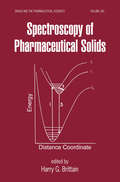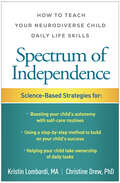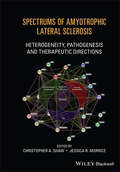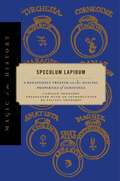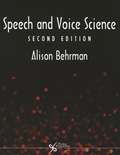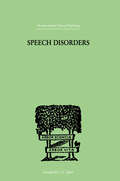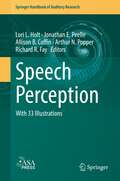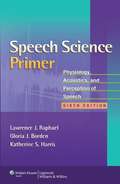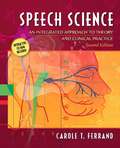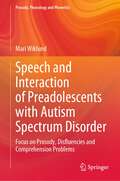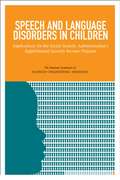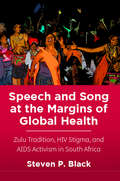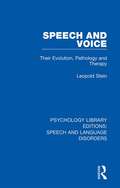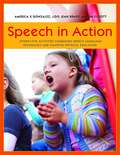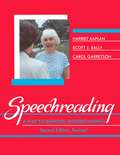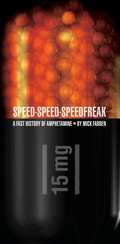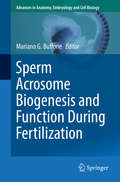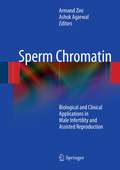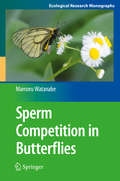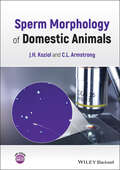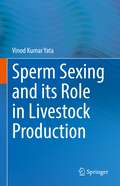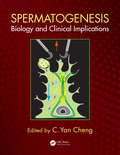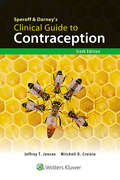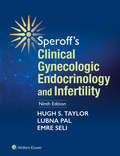- Table View
- List View
Spectroscopy of Pharmaceutical Solids
by Harry G. BrittainSelecting illustrative examples from the recent literature, this reference studies the underlying principles and physics of a wide range of spectroscopic techniques utilized in the pharmaceutical sciences and demonstrates various applications for each method analyzed in the text-showing how knowledge of the mechanisms of spectroscopic phenomena may
Spectrum of Independence: How to Teach Your Neurodiverse Child Daily Life Skills
by Kristin Lombardi Christine DrewAs a parent of a neurodiverse child, milestones that many families take for granted--like seeing your kid graduate from high school or college, get a rewarding job, and, eventually, leave the nest--may be fraught with uncertainty. How can kids who need loads of support to get through the day ever learn to take care of themselves? This motivating, practical book gives you concrete strategies for maximizing the independence of your child or teen with autism, intellectual disabilities, or other forms of neurodiversity. Exercises and downloadable worksheets are rooted in scientifically based behavioral principles and illustrated with vivid, empathic examples. By breaking down tasks like getting dressed, brushing teeth, or making a sandwich into manageable "microsteps," you will learn to phase out assistance gradually and systematically as kids take ownership of their routines. Actively boost your child's autonomy--this book shows how.
Spectrums of Amyotrophic Lateral Sclerosis: Heterogeneity, Pathogenesis and Therapeutic Directions
by Christopher A. Shaw Jessica R. MorriceSPECTRUMS OF AMYOTROPHIC LATERAL SCLEROSIS Discover state-of-the-art research findings on ALS from leading authors and editors in the fieldIn Spectrums of Amyotrophic Lateral Sclerosis: Heterogeneity, Pathogenesis & Therapeutic Directions, distinguished researchers and editors Dr. Christopher A. Shaw and Jessica R. Morrice deliver a practical and powerful perspective on Amyotrophic Lateral Sclerosis (ALS) as a heterogeneous spectrum of disorders. This increasingly accepted point-of-view allows researchers and medical professionals to develop better targeted interventions and more precise therapies.In the book, readers will find chapters on a wide variety of critical issues facing ALS researchers and healthcare practitioners treating ALS sufferers, including animal models of ALS, neuronal support cells known to have a pivotal role in ALS, and current challenges in ALS clinical trials, among others. The authors describe pathologic features common to all cases of ALS and why animal models, though crucial, should be interpreted with caution. Finally, multiple genetic and environmental etiologies of the disease are discussed.Readers will also benefit from the inclusion of:A thorough introduction to ALS as a spectrum disease and the implications for models, therapeutic development and clinical trial designExplorations of the genetic basis of ALS, prospective sALS etiologies, and the involvement of microbiome in ALSDiscussions of ALS-PDC and environmental risk factors, protein aggregation in ALS, defects in RNA metabolism in ALS, and the non-cell autonomous nature of ALS and the involvement of glial cellsExaminations of animal models of ALS and perspectives on previously failed ALS therapeutics and current therapeutic strategiesPerfect for clinical neurologists, healthcare providers and caretakers, clinicians, and researchers studying motor neuron disease, Spectrums of Amyotrophic Lateral Sclerosis: Heterogeneity, Pathogenesis & Therapeutic Directions is also an indispensable resource for the neurodegenerative research community, neurology residents, and graduate-level neuroscience students.
Speculum Lapidum: A Renaissance Treatise on the Healing Properties of Gemstones (Magic in History)
by Camillo LeonardiIn early modern Europe precious and semiprecious stones were valued not only for their beauty and rarity but also for their medical and magical properties. Lorenzo de’ Medici, Philip II of Spain, and Popes Leo X and Clement VII were all treated with expensive potions incorporating ground gems such as rubies, diamonds, and emeralds. Medical and magical/astrological lapidaries, texts describing the stones’ occult and medical qualities as well as their abilities to ward off demons and incantations, were essential resources for their use. First published in Venice in 1502, Camillo Leonardi’s Speculum Lapidum is an encyclopedic summary of all classical and medieval sources of lithotherapy.In describing the natural, manifest, and occult properties of precious and semiprecious stones as well as their graven images and applications, the Speculum Lapidum provides tremendous insight into the role that medical astrology and astral magic played in the life of an Italian court in the early modern period. Liliana Leopardi’s English translation, complete with critical apparatuses, gives unprecedented access to this key text within the magical lapidary genre. A vital addition to the existing canon of lapidaria in translation, Leopardi’s work will be of special importance for students and scholars of the history of magic, medicine, religion, and Renaissance humanism, and it will fascinate anyone interested in the occult properties of precious and semiprecious stones.
Speech And Voice Science
by Alison BehrmanThis second edition of Speech and Voice Science contains changes to help engage students in the learning process. The most significant changes include a reorganization of the introductory chapters, the inclusion of ample student study material, and classroom group activities. Each chapter now contains section study questions in addition to the end-of-chapter review questions, which have themselves been expanded. The section study questions are designed to help focus students to the key concepts as they read, and to assess their learning. The second edition has been revised and updated to be a better resource for students and instructors alike.
Speech Disorders: A PSYCHOLOGICAL STUDY of the Various Defects of Speech
by Stinchfield, Sara MFirst published in 1999. Routledge is an imprint of Taylor & Francis, an informa company.
Speech Perception (Springer Handbook of Auditory Research #74)
by Arthur N. Popper Richard R. Fay Allison B. Coffin Lori L. Holt Jonathan E. PeelleThis volume reviews contemporary developments in the auditory cognitive neuroscience of speech perception, including both behavioral and neural contributions. It serves as an important update on the current state of research in speech perception.The Auditory Cognitive Neuroscience of Speech Perception in ContextLori L. Holt, and Jonathan E. PeelleSubcortical Processing of Speech Sounds Bharath Chandrasekaran, Rachel Tessmer, and G. Nike GnanatejaCortical Representation of Speech Sounds: Insights from Intracranial ElectrophysiologyYulia Oganian, Neal P. Fox, and Edward F. ChangA Parsimonious Look at Neural Oscillations in Speech PerceptionSarah Tune, and Jonas ObleserExtracting Language Content From Speech Sounds: The Information Theoretic ApproachLaura Gwilliams, and Matthew H. DavisSpeech Perception under Adverse Listening ConditionsStephen C. Van Hedger, and Ingrid S. JohnsrudeAdaptive Plasticity in Perceiving Speech SoundsShruti Ullas, Milene Bonte, Elia Formisano, and Jean VroomenDevelopment of Speech PerceptionJudit GervainInteractions Between Audition and Cognition in Hearing Loss and AgingChad S. Rogers, and Jonathan E. Peelle Dr. Lori Holt is a Professor of Psychology at Carnegie Mellon University and has affiliations with the Center for the Neural Basis of Cognition and the Center for Neuroscience University of Pittsburgh. Dr. Jonathan E. Peelle is a Professor in the Department of Otolaryngology at the Washington University in St. Louis. Dr. Allison Coffin is an Associate Professor in the Department of Integrative Physiology and Neuroscience at Washington State University Vancouver.Dr. Arthur N. Popper is Professor Emeritus and research professor in the Department of Biology at the University of Maryland, College Park.Dr. Richard R. Fay is Distinguished Research Professor of Psychology at Loyola, Chicago.
Speech Science Primer: Physiology, Acoustics, And Perception Of Speech
by Lawrence J. Raphael Gloria J. Borden Katherine S. HarrisWritten in a clear, reader-friendly style, Speech Science Primer serves as an introduction to speech science and covers basic information on acoustics, the acoustic analysis of speech, speech anatomy and physiology, and speech perception. It also includes topics such as research methodology, speech motor control, and history/evolution of speech science. With its reader-friendly content and valuable online resources,Speech Science Primer: Physiology, Acoustics, and Perception of Speech, Sixth Edition is an ideal text for beginning speech pathology and audiology students and faculty.
Speech Science: An Integrated Approach to Theory and Clinical Practice (2nd edition)
by Carole T. FerrandTo demystify a topic that she has found often intimidates students, Ferrand (speech-language-hearing sciences, Hostra U.) breaks the material into explicitly linked units. Taking a systems approach, the author relates scientific concepts to human communicative behavior and clinical "mis" behavior. In addition to covering the standard topics of the nature of sound, the physiological systems involved, models and theories of speech production and perception, and clinical applications, she takes into account the impact on the field of technological advances. Includes review exercises, an extensive glossary, and an appendix of symbols for consonants and vowels. Annotation c. Book News, Inc., Portland, OR (book news. com)
Speech and Interaction of Preadolescents with Autism Spectrum Disorder: Focus on Prosody, Disfluencies and Comprehension Problems (Prosody, Phonology and Phonetics)
by Mari WiklundThe book focuses on the interaction of persons with autism spectrum disorder (ASD). ASD is a neurobiological developmental disorder, characterized by problems with social interaction, over-sensitivity to sensory stimuli and restricted interest (APA 2013). Problems with social interaction being a core feature of ASD, there is a scientific and a societal need for a book focusing on this topic. The book approaches the interaction of persons with ASD from a new angle. Firstly, where most studies on ASD are based on data coming from experimental settings, this book is based on naturally occurring data coming from group therapy sessions where 11–13-year-old Finnish- and French-speaking boys with ASD talk with each other and with their therapists. Secondly, the book treats a variety of themes that have so far been studied much less than, for example, the pragmatic problems of persons with ASD. These themes include the following aspects: speech prosody (characteristic features, perception of atypicality by neurotypical listeners), disfluencies of speech (comparison with neurotypical controls), comprehension problems (role of prosody, role of disfluencies, other causes), gaze behavior (eye contact avoidance strategies, using gaze as a source of feedback) as well as therapists’ response strategies and teaching orientations. The book is intended for researchers working in the field of autism, professionals working with persons with ASD as well as for families of persons with ASD.
Speech and Language Disorders in Children: Implications for the Social Security Administration’s Supplemental Security Income Program
by Engineering Medicine National Academies of SciencesSpeech and language are central to the human experience; they are the vital means by which people convey and receive knowledge, thoughts, feelings, and other internal experiences. Acquisition of communication skills begins early in childhood and is foundational to the ability to gain access to culturally transmitted knowledge, organize and share thoughts and feelings, and participate in social interactions and relationships. Thus, speech disorders and language disorders--disruptions in communication development--can have wide-ranging and adverse impacts on the ability to communicate and also to acquire new knowledge and fully participate in society. Severe disruptions in speech or language acquisition have both direct and indirect consequences for child and adolescent development, not only in communication, but also in associated abilities such as reading and academic achievement that depend on speech and language skills. The Supplemental Security Income (SSI) program for children provides financial assistance to children from low-income, resource-limited families who are determined to have conditions that meet the disability standard required under law. Between 2000 and 2010, there was an unprecedented rise in the number of applications and the number of children found to meet the disability criteria. The factors that contribute to these changes are a primary focus of this report. Speech and Language Disorders in Children provides an overview of the current status of the diagnosis and treatment of speech and language disorders and levels of impairment in the U.S. population under age 18. This study identifies past and current trends in the prevalence and persistence of speech disorders and language disorders for the general U.S. population under age 18 and compares those trends to trends in the SSI childhood disability population.
Speech and Song at the Margins of Global Health: Zulu Tradition, HIV Stigma, and AIDS Activism in South Africa
by Steven P. BlackSpeech and Song at the Margins of Global Health tells the story of a unique Zulu gospel choir comprised of people living with HIV in South Africa, and how they maintained healthy, productive lives amid globalized inequality, international aid, and the stigma that often comes with having HIV. By singing, joking, and narrating about HIV in Zulu, the performers in the choir were able to engage with international audiences, connect with global health professionals, and also maintain traditional familial respect through the prism of performance. The focus on gospel singing in the narrative provides a holistic viewpoint on life with HIV in the later years of the pandemic, and the author’s musical engagement led to fieldwork in participants’ homes and communities, including the larger stigmatized community of infected individuals. This viewpoint suggests overlooked ways that aid recipients contribute to global health in support, counseling, and activism, as the performers set up instruments, waited around in hotel lobbies, and struck up conversations with passersby and audience members. The story of the choir reveals the complexity and inequities of global health interventions, but also the positive impact of those interventions in the crafting of community.
Speech and Voice: Their Evolution, Pathology and Therapy (Psychology Library Editions: Speech and Language Disorders)
by Leopold SteinOriginally published in 1942, this title was recognised as setting new standards in the scientific approach to speech problems. Much speech therapy in the past had been unsatisfactory because of its emphasis upon the purely mechanical aspects of the condition, while at the same time the purely psychological approach was not sufficient to lead to satisfactory and radical treatment either. In this title the author combines the two approaches and by setting out the basic pathology of the various conditions, he throws new light upon them. Today it can be read and enjoyed in its historical context.
Speech in Action: Interactive Activities Combining Speech Language Pathology and Adaptive Physical Education
by America X. Gonzalez Jim Elliott Lois Jean BradyChildren, particularly those on the autism spectrum, are able to acquire communication skills much more easily when their learning incorporates movement. Even very simple actions such as tapping and hand clapping can have a noticeable impact on their speech and language development. Speech in Action is an innovative approach to learning that combines simple techniques from speech and language pathology with physical exercises that have been carefully designed to meet the individual child's particular needs and abilities. This practical workbook describes the approach, and how it works, and contains 90 fully-photocopiable lesson plans packed with fun and creative ideas for getting both mouth and body moving. Suitable for use either at school or at home, the activities can be dipped into in any order, and are organised by level of ability, with something for everyone. The final chapter contains the success stories of children the authors have used the activities with, demonstrating how the approach can be used in practice. This will be a useful resource for teachers, occupational therapists, and other professionals who work with children with delayed communication skills, as well as parents and carers who would like to support their child's speech and language development at home.
Speechreading: A Way To Improve Understanding
by Scott Bally Carol Garretson Harriet Kaplan"This book is a must for your office, for your clients, and for all public libraries." --Feedback "Unlike other consumer-oriented books on speechreading, this one not only focuses on practice exercises, but it also informs about the speechreading process and strategies to compensate for hearing loss . . . . This book could best be used by the professional as a client workbook to answer questions for hearing-impaired adults. It could also be beneficial to the hearing-impaired individual and his family members who are unable to enroll in therapy." --Ear and Hearing Speechreading: A Way to Improve Understanding discusses the nature and process of speechreading, its benefits, and its limitations. This useful book clarifies commonly-held misconceptions about speechreading. The beginning chapters address difficult communication situations and problems related to the speaker, the speechreader, and the environment. It then offers strategies to manage them. Speechreading provides practical exercises illustrating the use of these communication strategies in actual situations. It is an excellent book for late-deafened adults, families and friends, parents of children with hearing loss, and professionals and students. The three authors are all members of the Gallaudet University faculty--Harriet Kaplan is Associate Professor and Scott J. Bally is Assistant Professor in the Department of Audiology and Speech-Language Pathology, and Carol Garretson is former Assistant Professor in the Department of Communication Arts.
Speed-Speed-Speedfreak
by Mick FarrenElvis Presley, the Hell's Angels, Hunter S. Thompson, Truman Capote, the Beatles, Judy Garland, Hank Williams, the Manson Family, Jack Kerouac, Johnny Cash, JFK, and Adolf Hitler. All of the above were, at one time or another, to put it bluntly, speedfreaks.Speed-Speed-Speedfreak traces the criminal and cultural use of amphetamine and its growing use through each new and destructive cycle. The book will be printed in rounded pill capsule form, like the vaunted "black beauty" of pharmaceutical history.Mick Farren is the former lead singer of The Deviants and the author of more than forty books.
Spencer's Pathology of the Lung
by Philip Hasleton Md Frcpath Douglas B. FliederFully rewritten and updated for the cutting-edge sixth edition, Spencer's Pathology of the Lung follows in its predecessors' footsteps as the gold-standard textbook of pulmonary diseases. All recognized diseases of the lungs are discussed and illustrated with extensive, high-quality color images. Each chapter includes practical, clear and concise diagnostic features, including immunohistochemistry, molecular tests and differential diagnoses, while rare entities are discussed and illustrated in detail. This thoroughly reworked edition includes new classification schemes and the latest understanding of the pathophysiology and molecular aspects of a wide range of diseases. Non-neoplastic diseases are presented according to epidemiology, genetics, clinical manifestations, radiographic findings, pathology, cytology, laboratory findings, pathogenesis, differential diagnosis, prognosis and natural history. Neoplasms are discussed according to cell or origin with sections devoted to genetics, molecular findings and clinicopathologic correlations. Downloadable versions of all images are available on a CD-ROM packaged with the print book. Written and edited by leading experts in the field, this is an essential resource for practising and trainee pathologists.
Sperm Acrosome Biogenesis and Function During Fertilization
by Mariano G. BuffoneOver the last decades, acrosomal exocytosis (also called the "acrosome reaction") has been recognized as playing an essential role in fertilization. Secretion of this granule is an absolute requirement for physiological fertilization. In recent years, the study of mammalian acrosomal exocytosis has yielded some major advances that challenge the long-held, general paradigms in the field. Principally, the idea that sperm must be acrosome-intact to bind to the zona pellucida of unfertilized eggs, based largely on in vitro fertilization studies of mouse oocytes denuded of the cumulus oophorus, has been overturned by experiments using state-of-the-art imaging of cumulus-intact oocytes and fertilization experiments where eggs were reinseminated by acrosome-reacted sperm recovered from the perivitelline space of zygotes. From a molecular point of view, acrosome exocytosis is a synchronized and tightly regulated process mediated by molecular mechanisms that are homologous to those reported in neuroendocrinal cell secretions. The authors provide a broader perspective, focusing on a limited number of important topics that are essential for understanding the molecular mechanisms governing this step in the fertilization process. They also discuss molecular aspects such as the signaling pathways leading to exocytosis, including the participation of ion channels, lipids, the fusion machinery proteins and the actin cytoskeleton as well as cellular aspects such as the site of acrosomal exocytosis and the use of gene-manipulated animals to study this process.
Sperm Chromatin
by Ashok Agarwal Armand ZiniSperm DNA damage is common and has been associated with reduced rates of conception, impaired embryonic development and increased risk of miscarriage. Although the exact causes of sperm DNA damage are unknown, it is clear that infertile men possess substantially higher levels of sperm DNA damage than do fertile men. Written by leading, internationally renowned clinicians and basic scientists with expertise in sperm DNA, Sperm Chromatin: Biological and Clinical Applications in Male Infertility and Assisted Reproduction provides readers with a thoughtful and comprehensive review of the biological and clinical significance of sperm DNA damage. The work covers the fundamental principles of sperm chromatin architecture and function, the proposed modes of DNA damage and repair, the tests of sperm DNA damage, the clinical aspects of DNA damage and the impact of DNA damage on reproductive outcome. Unlike any other title on the topic, Sperm Chromatin: Biological and Clinical Applications in Male Infertility and Assisted Reproduction is an invaluable addition to the literature and will serve as an indispensable resource for basic scientists with an interest in sperm biology and for urologists, gynecologists, reproductive endocrinologists, and embryologists working in the field of infertility.
Sperm Competition in Butterflies
by Mamoru WatanabeThis book describes about 30 years of theoretical, empirical, and experimental work on butterfly sperm competition. It considers the reproductive morphology and sperm utilisation interests of males and females, which shape the mating tactics of each sex. Females of most butterfly species mate multiple times throughout their lives. The reasons are explored, as well as the numerous adaptations males have developed to prevent future mating and fertilisation by the sperm of other males. In particular, this volume focuses on the role of apyrene sperm. Eupyrene and apyrene sperm dimorphism is most likely a key factor in sperm competition, and the study in butterflies promotes understanding of sexual selection across animal species with sperm polymorphism. This book, describing the evolutionary causes and consequences of the sperm competition in butterflies, is a recommended read for students of behavioural ecology.
Sperm Morphology of Domestic Animals
by Jennifer Koziol Chance ArmstrongSperm Morphology of Domestic Animals A practical guide to interpreting sperm morphology of domestic animals Sperm Morphology of Domestic Animals is a concise, clinically-oriented resource for discovering any impairment to fertility caused by sperm anomalies in domesticated animals. As a bench-side reference, the book examines common sperm defects, their causes, and their prognosis for fertility. An easy-to-use reference, it is organized according to the placement of the deformity in the sperm to increase the speed of consultation, and to help with diagnosing fertility issues. Focusing particularly on the bull, stud horse, boar, ram, buck, and dog, it contains hundreds of high-quality color images accompanied by brief descriptions for additional diagnostic help. Readers will find: An easy-to-use reference work that is suitable for use next to the microscope Organization according to location of abnormality Hundreds if high-quality color images for easy comparison Brief descriptions accompanying each photo, for additional diagnostic help An ideal resource for veterinarians, andrologists, and veterinary students, Sperm Morphology of Domestic Animals fills a gap in current reproductive medicine resources with detailed information that is easy to consult.
Sperm Sexing and its Role in Livestock Production
by Vinod Kumar YataThis book presents basic principles and discusses the state-of-the-art methods of sperm sexing in livestock. It reviews the challenges and critical opinions on the conventional sperm sexing methods and characteristic features of spermatozoa of farm animals which could help to develop novel methods of sperm sexing. The book also presents principles and applications of flow cytometry for sperm separation. The chapters of the book elucidate methods and difficulties in developing sperm sexing methods. Notably, it covers recent research on immunological and nanotechnology-based sperm sexing methods. The book also provides information on the development of semen extenders. Towards the end, the book examines ethical and commercial aspects of sperm sexing. It is an ideal reference book for students, researchers and professionals working towards improving livestock production.
Spermatogenesis: Biology and Clinical Implications (Advances in Experimental Medicine and Biology #Vol. 638)
by C. ChengSenior investigators internationally have here collaborated to produce an international reference work. Each contributor provides critical and thought provoking concepts and ideas based on the latest developments in their field. The result is a must read and timely reference work for investigators who are interested in how spermatogenesis is currently understood and which are the most promising avenues for future research; an Introduction sets the context for the chapter and points out the relevance of the research for basic research scientists and clinicians.
Speroff & Darney’s Clinical Guide to Contraception
by Jeffrey Jensen Mitchell CreininPractical, authoritative, and up-to-date,Speroff & Darney’s Clinical Guide to Contraception, 6th Edition, provides concise coverage of all of today’s available contraceptive options. Under the leadership of new editors Jeffrey T. Jensen, MD, MPH, and Mitchell Creinin, MD, this well-regarded clinical reference remains a thorough, evidence-based, and readable resource for OB/GYNs, family planning specialists, primary care providers, and other healthcare providers.
Speroff's Clinical Gynecologic Endocrinology and Infertility
by Lubna Pal Hugh S. Taylor Emre SellOne of the world's most widely read gynecology texts for nearly 50 years, Speroff ’s Clinical Gynecologic Endocrinology and Infertility provides a complete explanation of the female endocrine system and offers practical guidance for evaluation and treatment of common disorders. In this fully revised ninth edition, the editorial and author team from Yale School of Medicine have assumed the reins of Dr. Speroff’s landmark work, retaining the clear, concise writing style and illustrations that clarify and explain complex concepts. This classic text remains indispensable for students, residents, and clinicians working in reproductive endocrinology and infertility, bringing readers up to date with recent advances that have occurred in this fast-changing field.
